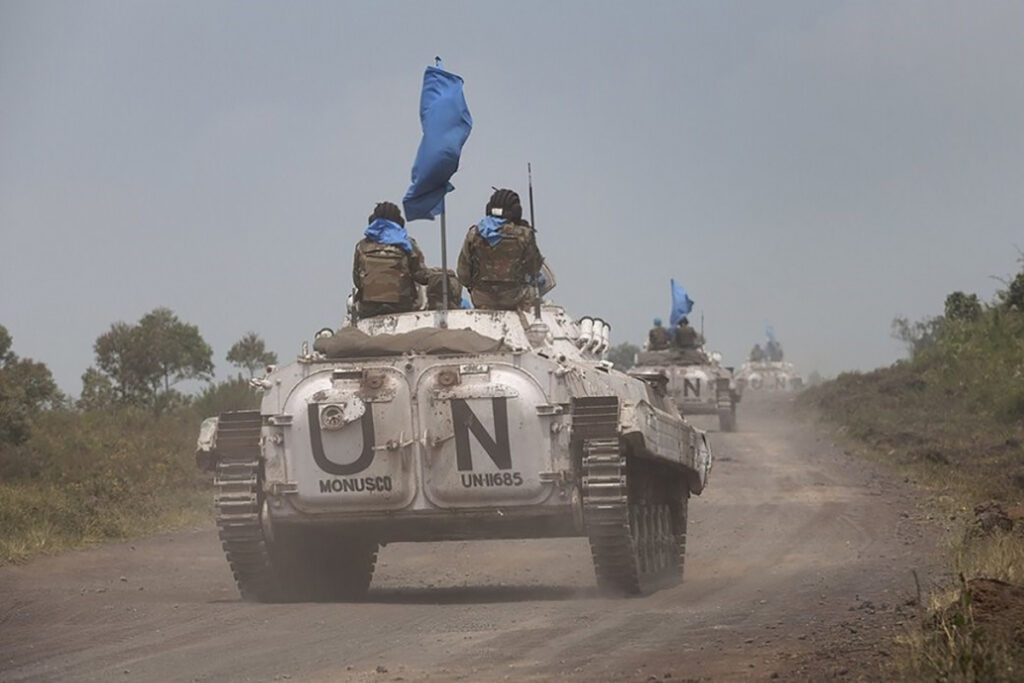The authorities in Nagorno-Karabakh have called for a UN-mandated peacekeeping mission as a ‘security guarantee’ for the region’s Armenian population.
On Tuesday, the president of Nagorno-Karabakh, Arayik Harutyunyan, told France24 that they were seeking ‘more fundamental international guarantees’ as the five-year mandate of Russian peacekeeping troops in Nagorno-Karabakh ends in two years.
The November 2020 ceasefire agreement that brought an end to the Second Nagorno-Karabakh War included a five-year deployment of up to 2,000 Russian peacekeepers, renewable with the agreement of all sides.
‘Today, the fate of the Artsakh [Nagorno-Karabakh] Armenians is in danger’, Harutyunyan said. ‘Genocide? Ethnic cleansing? There is no difference for us because we would have to leave Artsakh. For us, that is tantamount to dying. We have lived on our land for millennia, and we want to continue living there’, he said.
Later, the acting Foreign Minister of Nagorno-Karabakh, Davit Babayan, told RFE/RL that they wanted the UN Security Council to give the Russian peacekeepers an ‘indefinite’ international mandate. Babayan called it ‘the best way’.
The five-year term of the Russian peacekeeping contingent in Nagorno-Karabakh expires in 2025, and over 2,000 troops deployed to the region following the Second Nagorno-Karabakh war would have to leave in case one of the sides objects to the extension.
Armenian authorities and Prime Minister Nikol Pashinyan himself have repeatedly emphasised the importance of an international peacekeeping force in Nagorno-Karabakh. According to Pashinyan, a mandate could be given to either a Russian or a multi-national peacekeeping force.
In a recent meeting between Pashinyan, Aliyev, and Vladimir Putin, Pashinyan failed to reach an agreement on extending the peacekeeping mission. ‘But I must note that in my perception, the issue became an agenda item’, Pashinyan said after the meeting.
Pashinyan also proposed to extend the mandate of peacekeepers automatically regardless of the objection of any side.
‘In our opinion, the signatures of Armenia and Russia are sufficient to fully implement this [peacekeeping] mandate. And if not, then it is necessary to take measures to confirm that mandate internationally or to endow the peacekeepers with a wider international mandate’, Pashinyan stated in August.
The French National Assembly, too, in a recent resolution calling for France to consider imposing sanctions against Azerbaijan, urged the government to explore the possibility of contributing to an international peacekeeping force to ‘ensure the end of hostilities in the South Caucasus’. The resolution adopted in early December echoed a November resolution passed by the French Senate, which called for the French government to ‘request the deployment of an international peacekeeping force to guarantee the security of the Armenian populations [of Nagorno-Karabakh] and of Armenia’.
Azerbaijani officials have frequently railed against the extension of the Russian peacekeeping force’s mandate, actively propagating against their presence in the region.
In an 8 November Victory Day speech, Aliyev warned the Armenian population of Nagorno-Karabakh not to rely on the Russian peacekeepers, stating that they were ‘stationed temporarily’.
‘We are teaching them this lesson, and we hope that they will eventually understand it and take care of their internal affairs. Stop digging up our land, our Karabakh. Karabakh is our land. The Russian peacekeepers stationed there are temporary’, Aliyev said.
Azerbaijani media, and later the Defence Ministry, appear to have stepped up a campaign against Russia and its peacekeeping mission.
Most recently, the ministry chided the Russian Defence Ministry for not using the Azerbaijani names for settlements in Nagorno-Karabakh, as well as for using the term ‘Nagorno-Karabakh’. Azerbaijan claims that no entity called ‘Nagorno-Karabakh’ exists.
For ease of reading, we choose not to use qualifiers such as ‘de facto’, ‘unrecognised’, or ‘partially recognised’ when discussing institutions or political positions within Abkhazia, Nagorno-Karabakh, and South Ossetia. This does not imply a position on their status.
Correction: An earlier version of this article stated that Davit Babayan is the Foreign Minister of Nagorno-Karabakh. Babayan was demoted to acting minister in a government reshuffle on 23 November 2022.




 9 December 2022
9 December 2022



